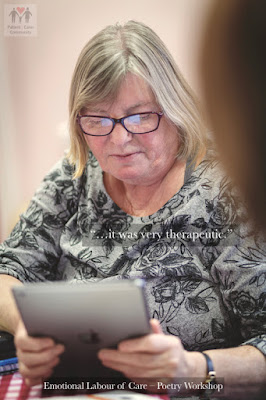The project and film caused quite a stir. It offers a patient/carer voice on the experience of healthcare written by patients and carers and performed by them as well. From that project sprang the idea of a more ambitious project borrowing a theme explored by healthcare professionals called the emotional labour of care.1
Once again with the support of Jools and Nicola I wrote a substantial funding bid that would enable two facilitators to run, evaluate and produce learning resources as key outputs starting in March 2016 and finishing 12 months later in 2017. We invited Karen Hoffman to join me as co-facilitator. Karen has an extensive background of patient involvement. As a practicing Counsellor she also brought key communication skills to the project that would free me up to concentrate on the poetry aspect of the workshops.
 |
| The Emotional Labour of Care Poetry Workshop |
This poetry project aimed to bring patients, carers, students and healthcare professionals together to explore via the lens of the art and humanities the concept of the emotional labour of care. I offer that all those actors experience the work of the emotional labour of care. Rarely do we have the opportunity to acknowledge that work, let alone share it with one another.
As a poet and workshop facilitator I use poetry with a diverse range of people, many of whom don't feel that they – get poetry, or that poetry gets them.2 It doesn't take long for those same people to realise, with the use of some simple creative writing exercises, to realise that we suffuse our everyday language with the building blocks of poetry – metaphor, similes, rhythm, and rhyme.
When I listen to my fellow patients and carers at the PCC I hear those very same building blocks as they describe the ways in which they experience they respective health conditions. When I listen to healthcare professionals I hear those very same building blocks as they describe the ways in which they experience their practice of healthcare.
 |
| The Emotional Labour of Care Poetry Workshop |
This workshop aimed to offer the arts and humanities as a way to give voice to patients, carers, and health care professionals, from both acute and long term healthcare settings, as a way of connecting with and making sense of this shared emotional labour of care.
The medium of the arts and humanities would, we hoped, offer participants a shared platform to shine a light on healthcare as a shared experience. What we encountered often surprised, raise questions, or sparked an affinity for a different way of looking at things.
I think the arts and humanities, paraphrasing the famous Heineken advert, can reach the parts of healthcare that the language of the bio-medical can find hard to reach. The arts and humanities can give patients, carers, healthcare professionals and wider society another voice and medium to understand our experience of health from a wider narrative horizon.
In finding that voice or means of expression, all can gain a renewed a sense of perspective on healthcare. We can begin to describe what has happened in our own way and in doing so begin to explore the potential for shared understanding and shared decision making.
Just as significant, the arts and humanities enable us to share with others what we have experienced. To describe the path we have walked and the journey we face. It can also allow others to walk beside us too even if they can't walk in our shoes. A therapist I once worked with said of my poetry, ‘You know what Philip, your poetry isn't just for you. Your poems also offer a window into your experience.’
 |
| The Emotional Labour of Care Poetry Workshop |
It didn't matter if the participants felt they knew anything about poetry or even liked all poetry we explored. We aimed to show that healthcare professionals, patients and carers use the building blocks of poetry, metaphor and simile, all the time when we talk about health, life, and death. We just don't recognise it sometimes.
We await evaluations from the workshops and plan to offer the outcomes from this project to create a learning resource for students across the School of Medicine, at the University of Leeds.
We hope that we can build on this project to continue to offer innovative and well conceived projects to students that supports their appreciation that healthcare and our respective experience of it happens within a wider context. That the arts and humanities can shine light upon our experience of healthcare in a way that reveals the human being behind the mask of the actor within its play.
References
1. https://www.nursingtimes.net/roles/district-and-community-nurses/the-emotional-labour-of-nursing-1-exploring-the-concept/2002711.article
2. http://www.poetryarchive.org/interview/adrian-mitchell-interview